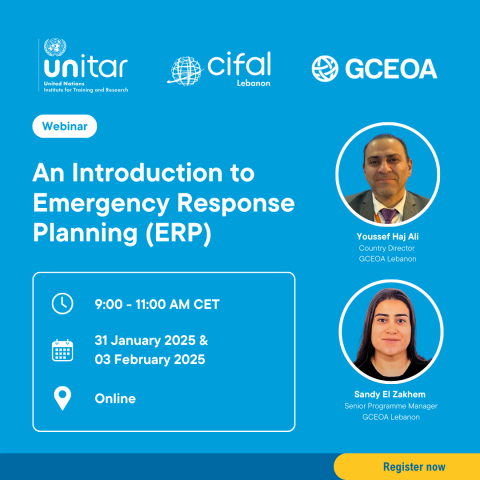
UNITAR Online Catalogue
CIFAL Lebanon - An Introduction to Emergency Response Planning (ERP)

Personas
Global CEO Alliance, CIFAL Lebanon
Antecedentes
Emergencies and crises, whether natural or man-made, pose significant challenges for organizations and communities. While many understand the importance of being prepared, the process of developing and implementing an Emergency Response Plan (ERP) can often feel intricate and challenging. This webinar aims to break down the complexities of ERP by exploring its key components and its critical role in effective crisis management. Drawing on established frameworks and practical insights, the session provides a comprehensive understanding of how organizations can enhance their preparedness and response capabilities.
Objetivos del evento
The webinar aims to introduce participants to the essentials of Emergency Response Planning (ERP) by providing a foundational understanding of its purpose and practical application. It seeks to explore the humanitarian frameworks, processes, and principles that guide effective crisis management, while offering insights into tools and strategies for risk assessment, sector planning, and resource mobilization. By fostering dialogue and sharing practical knowledge, the session aims to empower participants to take initial steps toward improved preparedness and response efforts.
Objetivos del aprendizaje
- A foundational understanding of ERP and its importance in crisis management.
- Knowledge of key humanitarian principles and their role in emergency response.
- Practical insights into tools for risk assessment and sector planning.
- Awareness of how sector campaigns and Flash Appeals support response efforts.
The confidence to explore ERP concepts within their own context or organization.
Contenido y estructura
Day 1
- Introduction
- Welcome and Brief Introduction on CIFAL Lebanon
- Opening Remarks from CIFAL Executive Director
- Overview of Webinar Topic and Objectives
- Introduction of Speaker
- Session 1
- Understanding Emergency Response Planning
- Definition of an ERP: What is an Emergency Response Plan?
- Purpose and Importance: Why is having an ERP crucial for organizations?
- Key Elements of an ERP: Overview of essential components
- Humanitarian Project Cycle (HPC):
- Needs Assessment
- Project Design
- Resource mobilization
- Implementation
- Monitoring and Evaluation
- Reporting and Learning
- Understanding Emergency Response Planning
- Interactive Poll
- Break
- Session 2
- OCHA key role in the crisis cycle’s management: Preparedness, Response, Recovery and Reconstruction
- Core Humanitarian Principals in a Crisis: Humanity, Impartiality, Neutrality and Independence
- Q&A Session
- Open the floor for participant questions
- Closing for Day 1
- Survey
- Reminders for Day 2 Session
DAY 2
- Session 2
- Recap of Key Points from Day 1
- Risk Assessment and Hazard Identification
- Conducting a Risk Assessment: Steps to identify potential emergencies.
- Evaluating Risks: Prioritizing based on likelihood and impact.
- Mitigation Strategies: Measures to reduce risks
- Monitoring and Review
- Q&A
- Post Assessment
- UNITAR Survey
- Closing
- Closing Remarks from Executive Director or CIFAL Lebanon Representative
- Reminders on Course Certificates
Metodología
There will be a pre-assessment to gauge the participants' existing knowledge of Emergency Response Planning (ERP) and its key concepts. The session will then proceed with an engaging discussion on ERP and its critical role in building resilience and supporting sustainable development. Real-world examples will be shared to illustrate the practical application of ERP strategies. The webinar will conclude with a Q&A session to address participant questions, followed by a post-assessment to evaluate the knowledge gained during the session.
Público objetivo
This webinar is designed for:
- Professionals and practitioners seeking to strengthen their understanding of Emergency Response Planning.
- NGOs, community organizations, and teams who are new to developing ERPs.
- Students and early-career professionals interested in learning about humanitarian and crisis management frameworks.
- Anyone looking for a practical introduction to the key elements of ERP and its role in preparing for and responding to emergencies.
This session is ideal for those who may not yet consider themselves experts but are eager to build their knowledge and engage in thoughtful discussions about crisis preparedness and planning.